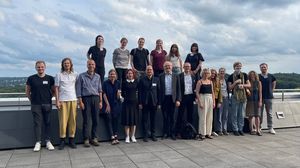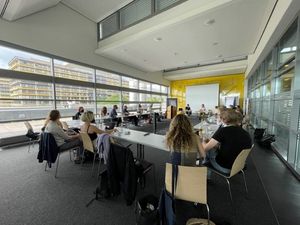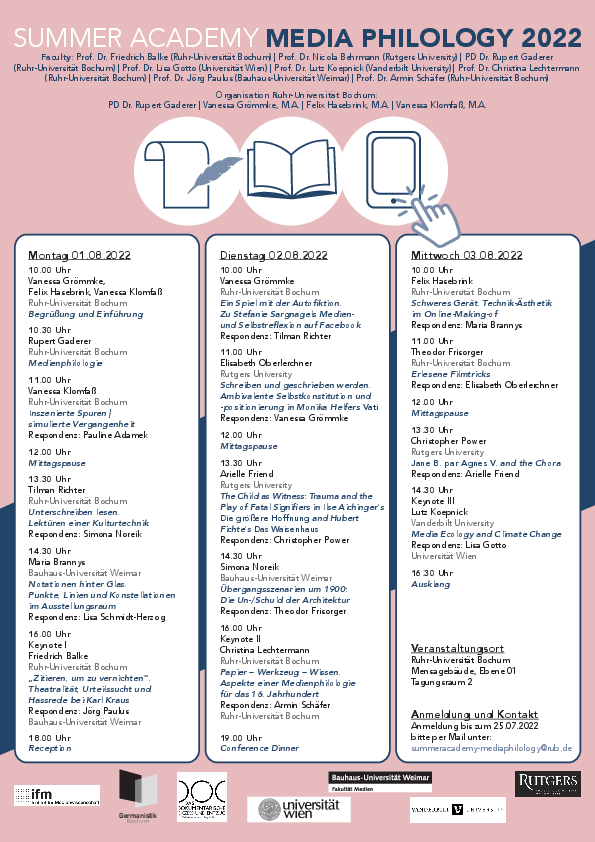- Sie sind hier:
- Startseite
- Promovierende
- Förderprogramme zur Internationalisierung
- Project International Event
- Funded International Events
- Summer Academy Media Philology
Summer Academy Media Philology – 5th edition
August 1-3, 2022
The “Summer Academy Media Philology” is a joint Summer School for doctoral students in the humanities and arts, organized by a committee of PhD candidates. The purpose of the event is to discuss individual PhD projects, share ideas about theoretical approaches and methodology, and gain insights in current research projects from established experts in the field. Moreover, the Summer Academy Media Philology provides the unique opportunity to connect with other PhD candidates from various German, Austrian and US universities.
The Summer Academy originated from a research project on “Media Philology” at the Department of Media Studies. The first Summer Academy at Ruhr-Universität Bochum took place in August 2018, with Rutgers University, New Jersey, as its main partner. A second edition was organized by the German Department of Rutgers University in August 2019. The third edition was to take place in Bochum again in August 2020 but had to be postponed due to the Covid-19 pandemic. After two virtual Academies as interim editions, the organizers at RUB were happy to host the Summer Academy again as a face-to-face event in August 2022, now partnering with Rutgers University (New Jersey), Vanderbilt University (Nashville), Bauhaus Universität Weimar and the University of Vienna.
Over the course of three days, five doctoral candidates from Rutgers University and Bauhaus Universität Weimar as well as five doctoral candidates from Ruhr-Universität Bochum presented extracts from their PhD projects. The ten-page papers were read by the whole group in preparation. Individual graduate students prepared a “response” with critical commentary to a paper from one of their peers. These responses were designed to stimulate a discussion among the entire group. Keynotes by faculty members from Ruhr-Universität Bochum and Vanderbilt University (Nashville) concluded the day. Other faculty members from Ruhr-Universität, Bauhaus-Universität and Vienna delivered a lengthy response to each keynote and moderated the ensuing discussion.
The organizers grouped the papers and keynotes according to overarching thematic and methodological concerns. Contributions on the first day focused on modes of writing and the epistemology and aesthetics of written artifacts, in the form of carefully crafted, artificial traces in examples of “multimodal literature”, the act of signing as a cultural technique, and the display of written documents in curated exhibitions. Professor Friedrich Balke (Ruhr-Universität Bochum) gave a keynote lecture on practices of quoting and citing in the work of Karl Kraus as prime examples of what he calls “forensic literature”.
The second day saw two papers on autofiction – in social media channels of Austrian writer Stefanie Sargnagel as well as in contemporary novels by Monika Helfer –, followed by a study on trauma and witnessing in llse Aichinger and Hubert Fichte and a paper on the interrelations of architectural transitions and the “uncanny”. As a second keynote, Professor Christina Lechtermann (Ruhr-Universität Bochum) presented her research on printed, richly illustrated German-language craft manuals from the 16th century.
Film and representations of moving-image production processes were core topics on the last day. Three papers focused on online-based “making-of” documentaries, set photography in LIFE magazine, and a hybrid documentary film by French director Agnès Varda. For the last keynote, professor Lutz Koepnick (Vanderbilt University) presented a close reading of current media art installations and their efforts to represent the climate crisis of our time (quite fittingly, it was the hottest afternoon of this year’s Summer Academy).
The goal of the Academy was to create a stimulating environment for both PhD students and established researchers. Ideally, the discussions and debates will have a sustainable effect on the work presented and may result in future cooperation among individuals and partnering institutions.
After much rescheduling and necessary postponements, all participants were happy to finally convene in person at Ruhr-Universität Bochum. We thank all partners and faculty members for their generous support and wish to extend our sincere gratitude to the RUB Research School for making this event possible.
This workshop was oranized by a team around Vanessa Klomfaß. If you have any questions about the workshop, she will be happy to hear from you via e-mail.
- Forschungsbezogene Kompetenzen: Workshops & Veranstaltungen
- Karrierevorbereitung: Workshops & Veranstaltungen
- Forschungsmanagement Skills: Workshops & Veranstaltungen
- Liste aller Workshops & Veranstaltungen
- Förderprogramme zur Internationalisierung
- Beratung & Ombudsperson
- Promovierenden-Datenbank
- Welcome Hour
- Newsletter





